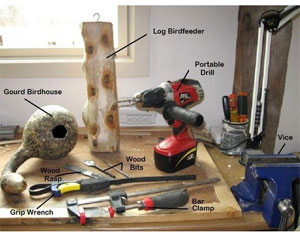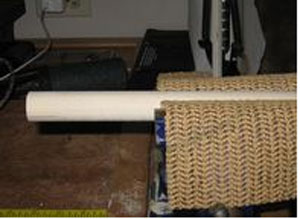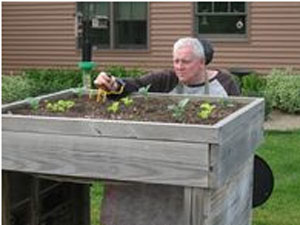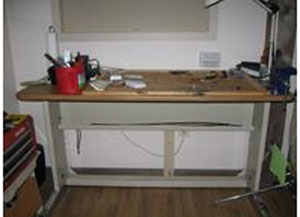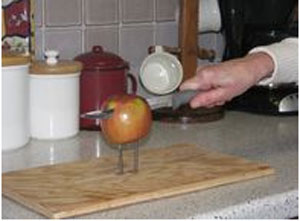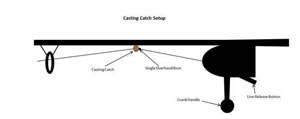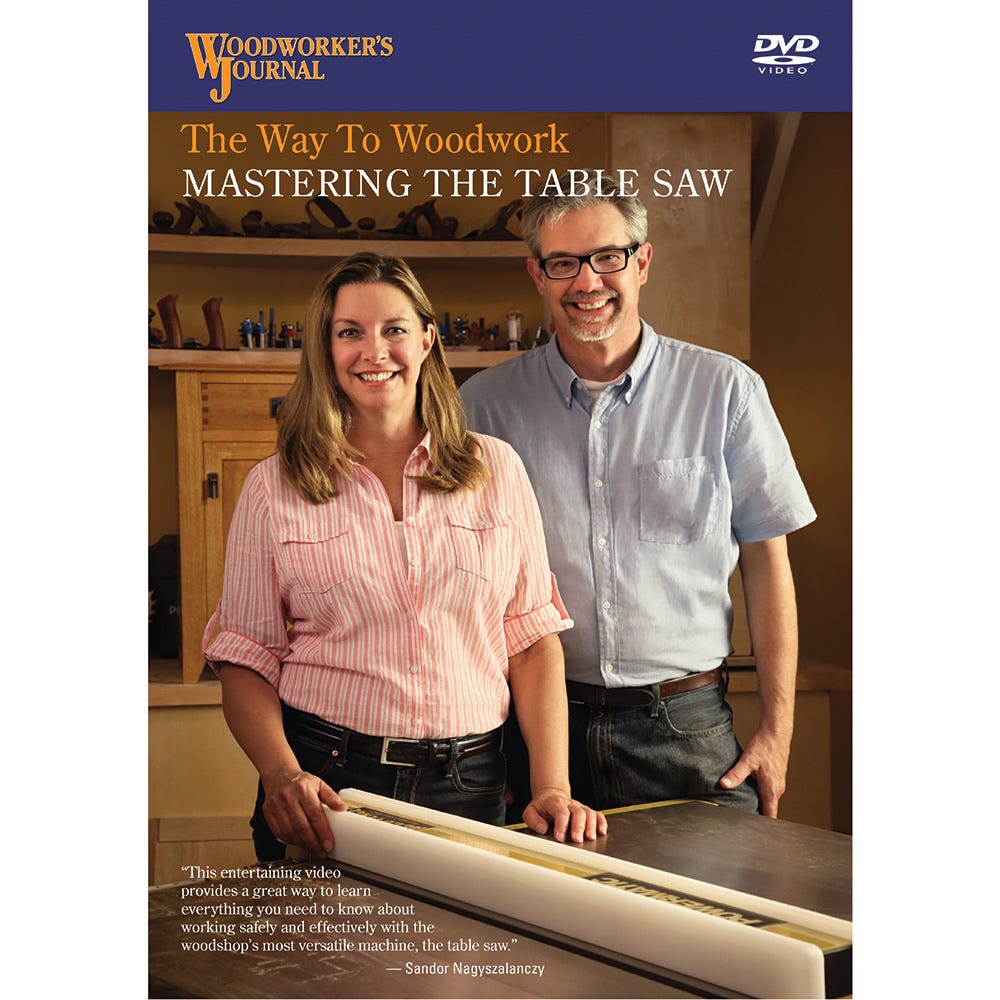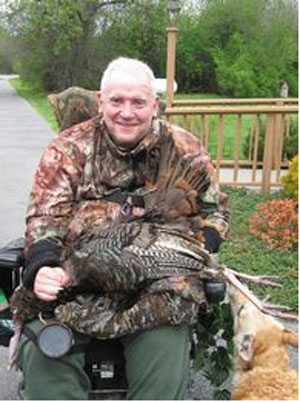
Rich Fabend’s woodworking — and his other projects, for that matter — have a specific purpose: “My sole purpose is to help people with disabilities,” Rich said.
He does this through a variety of adaptive products, made using wood and other materials, that he shares on his site HandiHelp.net. Rich also has a blog, a presence on Facebook, and guest columns on other sites aimed at providing information to the disabled, including Christopher Reeve’s. “When I was originally recovering from my injury, I was dumbfounded at the prices of things made for people with disabilities,” Rich said. “I want to help other people avoid the frustration process I had to go through.”
Rich was a semi-retired high school teacher when a wave struck him down during a Caribbean vacation in 1999, leaving him a quadriplegic. Before his injury, Rich had been a casual builder, making some outbuildings and some furniture for his home, including a dry sink and cabinets. Hardwoods stymied him, however: “I couldn’t seem to get them built real well, so I kind of restricted myself to pine.”
After his injury — and the sticker shock at the prices of adaptive items — he began making things himself, with some assistance from his wife and son. At the encouragement of friends, he started the HandiHelp website as a platform to share his ideas and those other people sent in.
For example, Rich has a page dedicated to “Wooden Handles.” They begin with a 1″ dowel, into which a sleeve is inserted, usually by means of an Allen wrench. Putting a crosspiece on the handles has meant that Rich has been able to strap binoculars to them so he can hold and look through them. Making those handles, Rich said, is “very time-consuming, but satisfying.” As a result of his injury, “my hands are in a semi-gripped closed position. I can saw with a hand saw or a coping saw. I’m able to drill; I can get a drill in my hand and press it into the wood, usually with my head.” He also uses a Dremel for some activities, mainly things like smoothing edges on PVC pipe or similar functions.
“A lot of people become disabled, and they become caught up in the idea that if they can’t do things they way they used to, they can’t do them. I encourage people to change their way of thinking,” Rich said. “Things can be done; it’s a matter of how much time and persistence you’re willing to put into it. There’s almost always a solution.”
For example, for Rich himself, “It’s almost impossible for me to use a screwdriver, but things with an Allen wrench usually work really well.” Citing the quotation from the ancient Greek Archimedes, “Give me a lever long enough … and I shall move the world,” Rich notes thatadding pipes, sometimes slotted into each other in a series, to his wrenches, will allow him to turn almost anything.
He also receives assistance from his wife and son, noting that, “My wife is indispensable in assisting me when I get to a point where I can’t quite complete something.” His son, who shared Rich’s interest in woodworking as he grew up, has cut fence posts into 10″ or 12″ pieces, which Rich then drills with a 3/4″ bit, followed by a 3/8″ hole beneath it where he inserts a wooden dowel for a perch, and gives out as suet feeders for Christmas gifts.
After Rich started doing jigsaw puzzles as therapy, but had difficulty picking up even the larger pieces designed for people with arthritis, his son made frames with raised edges that allow Rich to work the puzzle piece toward the edge of the frame and pick it up. They worked so well, Rich said, that he had his son make him a large raised-edge frame for his worktable. “If I’m using a screw or something like that, I can get it to the edge of the frame to either pick it up myself or use a magnet to pick it up. It’s extremely simple, but useful for individuals with grip or range of motion problems.”
His site, however, is not limited to ideas that Rich has generated himself. One project, a cutting board, came about because someone contacted him about having seen a board with two nails protruding from it that were used to hold steady the item being cut. Rich used plywood to create such a board and has also shared the instructions for another cutting board, this one created by a friend, that has a knife permanently fastened to it so that bread, vegetables, etc., can be placed under the knife and pressure exerted on it.
With his desire to help others, Rich likes to respond to requests such as that for the cutting board. He has a particular desire to help returning wounded veterans, noting that, while they may be very eager and motivated at first, “I know there’s going to be a time in their life when they realize how demanding their new lifestyle is. I have a very strong desire to help them adapt.”
That’s one reason some of the projects Rich is most proud of are his adaptations that allow disabled people to participate in activities like hunting and fishing — activities he says that many veterans want to resume. “I love being outdoors,” Rich said, “and when I was recovering, I thought that would be impossible to return to. The ability to get back to that was wonderful for me.”
He’s made a trigger adapter that allows him to shoot by pulling on a knotted string that goes in his mouth, while steadying the gun with his hands — and managed to bag two turkeys after building this. For fishing, Rich made a casting adapter with a long piece of 3/8″ dowel with a slit cut in it with a coping saw. He fastened this on the fishing rod, and tied a knot in the line. “The knot catches and holds the line in place, and the centrifugal force of my cast pulls the line out of it. I can cast 15 to 20 yards with a little piece of wood taped to my fish pole. It amazes me how well it works.”
You can find instructions for all of these items on his site. “I try to put as much as I can out there, for an individual to make, or to have a friend or a professional nearby make it for them.” Many people, Rich said, such as woodworkers, machinists, etc., are willing to help the disabled in their neighborhoods, but people don’t necessarily seek them out.
Rich, on the other hand, is putting all of his information out there for free, and it’s being used worldwide. His site has been translated into different languages — including Spanish, at the request of the government of Spain — and is part of the Global Disability Rights Library, a portion of the WiderNetProject (providing Internet-based information to developing countries with limited Internet access).
He sums up his philosophy on the homepage of his site: “Believing that something is possible is the first step in taking control of your situation…Allowing yourself to be sidelined by difficulties, frustration or failure is counterproductive.” In fact, Rich goes on to say, “I am constantly thinking about new ways to do things, revisiting the tools and ideas I have already come up with to try and improve them or make them more multifunctional.”
